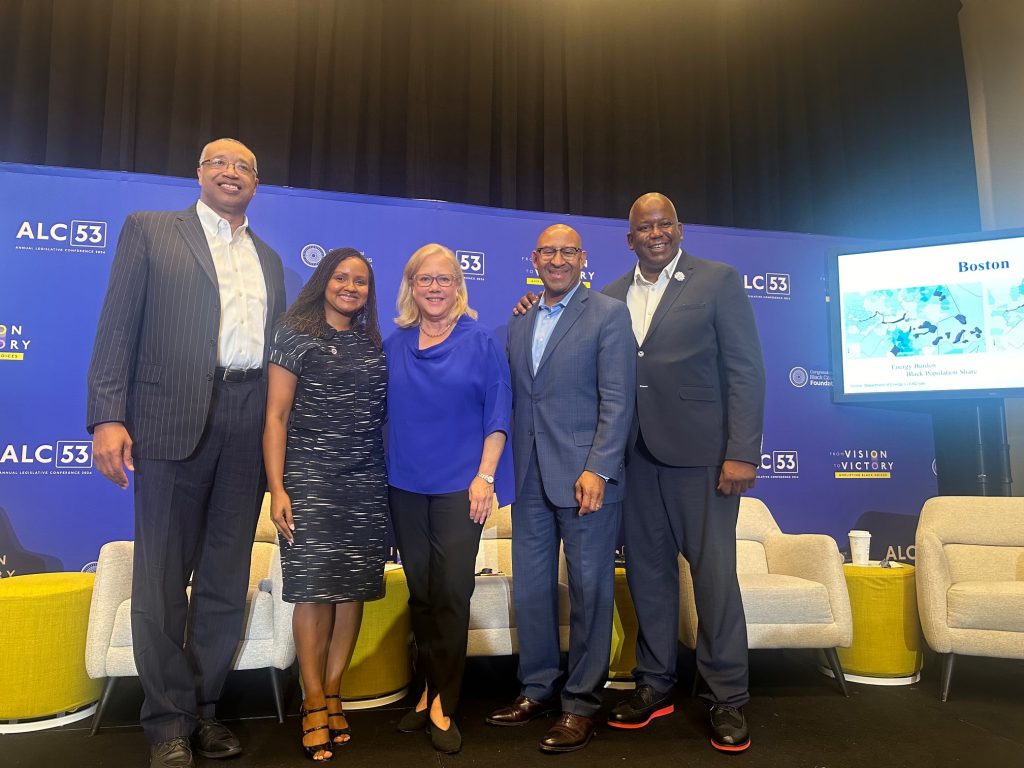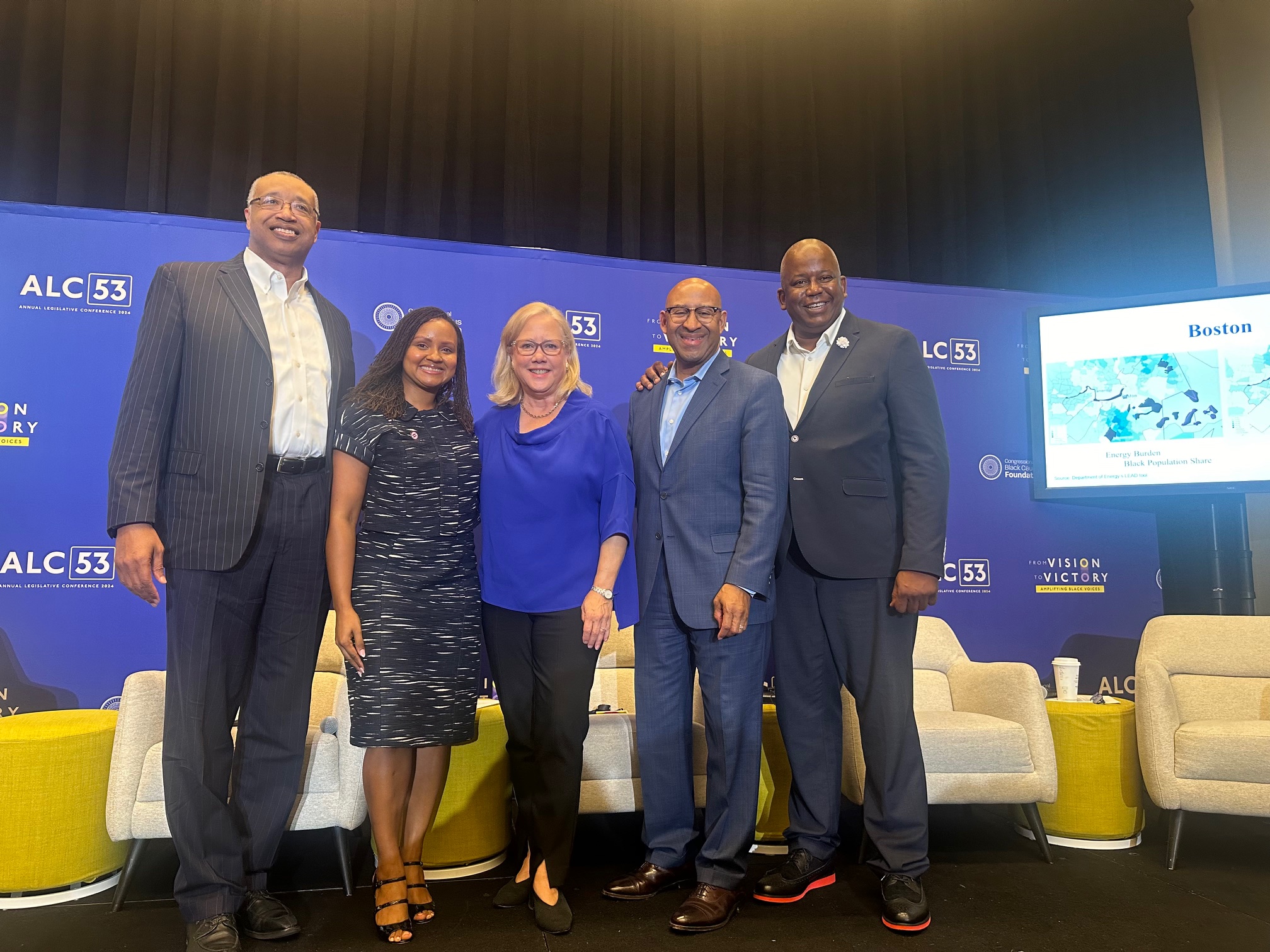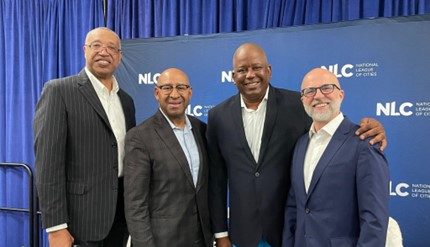Natural Allies Leads Environmental Justice Panel at the CBC Foundation Annual Legislative Conference Highlighting Need to Expand Natural Gas Infrastructure to Ensure Affordable Energy for All
Leaders discuss the energy transition and the need to expand existing energy sources, including natural gas, to meet increasing energy demand, lower emissions and ensure accessibility, affordability and equity for Black and Brown Americans

former Philadelphia Mayor Michael Nutter and former Congressman Kendrick Meek (D-FL)
(Washington, D.C.) – On Thursday, September 12, members of Natural Allies Leadership Council participated in a panel conversation entitled, Powering Black Communities: Shaping Energy Policy for a Sustainable Future, at the Congressional Black Caucus Foundation (CBCF) Annual Legislative Conference in Washington, D.C. The conversation centered around the energy transition and the need to expand existing energy sources, specifically natural gas infrastructure, to meet the increasing energy demand, lower emissions and ensure accessibility, affordability and equity for Black and Brown Americans.
Former Philadelphia Mayor Michael Nutter, Co-Chair of Natural Allies Leadership Council, who participated on the panel said, “It is important that our energy policy choices do not leave historically marginalized communities behind as we move toward a more diverse energy mix. That is why natural gas partnered with renewables is the most immediate, affordable, and accessible way forward to keep energy bills lower and reduce carbon emissions.”
Former Senator Mary Landrieu (D-LA), Natural Allies Leadership Council Co-Chair, moderated the panel and was also joined by panelists, Ralph Cleveland, President & CEO of the American Association of Blacks in Energy and Tara Murray, Executive Director of the National Urban League’s Washington Bureau. Former Congressman Kendrick Meek (D-FL), Natural Allies Co-Chair and CBC Director Emeritus, along with Congressman Steven Horsford (D-NV), Congressional Black Caucus Chairperson, also made remarks at the session.
The panel highlighted preliminary results from an upcoming Progressive Policy Institute (PPI) report, Energy Cost Burdens and Pragmatic Environmental Justice. The PPI report stated that in an era of increasing energy demand, some environmental activists are insisting that cities constrain their supply of natural gas, either through denial of new natural gas pipelines or dismantling existing infrastructure.
“Simple economics tells us that increased demand and reduced supply results in higher prices. The most disadvantaged citizens in the most efficient places to live are shouldering the cost of this folly,” said Neel Brown, Managing Director of the Progressive Policy Institute (PPI). “We need to make sure we are not imposing unbearable burdens through blackouts or utility shutoffs in the most disadvantaged neighborhoods. Between these new household electricity loads and new manufacturing, data centers, hydrogen, and direct-air capture facilities, the energy transition needs more than replacement of existing sources, we need an expansion.”
Panelists discussed how the energy transition could disproportionately impact middle-class and working-class families, potentially leading to higher bills especially if energy demand outpaces supply. Currently, over 40% of Black households are already reporting they are cutting food and medicine to pay their energy bills – double that of white households. This energy insecurity can also lead to negative health and education outcomes.
“When we talk about environmental justice – it must be about more than just lowering emissions, it must also consider affordability. Environmental justice means middle- and lower-income families being able to afford their electric bills – it is energy you can afford, cleaner than the past, and paves the way for a cleaner energy future,” said moderator Sen. Landrieu. “We need to make sure the most vulnerable communities are part of the conversation and not rely on wealthy, white progressives to push an agenda that exacerbates the affordability and equity challenges already faced by overburdened communities. We must have a balanced approach with natural gas partnered with renewables, which drives down emissions, protects reliability, at the lowest price point for the community.”
Panelist Ralph Cleveland emphasized the significant role Black professionals and workers must play in the new energy economy. “We are going through a major transformation that needs our best skills, resources, and solutions. Natural resources like natural gas give us an advantage,” said Cleveland. “Leveraging the powerful expertise of 720,000 Black professionals and workers in the energy industry will help us reach our 2030 goals, benefiting all communities.”
To support growing sources of renewable energy, panelists emphasized the need to balance it with more natural gas infrastructure including pipelines, smarter local electric distribution grids, and more long-distance electric transmission to balance out variable part-time power resources that are reducing reliability and driving up costs in areas like Boston, Los Angeles and New York. Natural gas is a low-cost, reliable energy source that can provide stability to communities in need, while helping reduce harmful emissions.
CBC Chair Horsford reinforced to the audience how vital America’s energy policy is to the country’s economy, stating, “We are open to an all of the above approach to energy focused on having the resources we need, having the jobs, having the procurement and business opportunities, and having the investment in the communities where that energy production is happening.”
PPI’s study will be completed at the beginning of 2025 and will provide members of the Congressional Black Caucus information on how to keep the energy transition moving forward while lowering emissions in the fairest, most just way.
“CBC members have a critical role to play in America’s energy equity debate,” said Congressman Meek. “We must think about more pragmatic solutions that drive down emissions while ensuring reliability and affordability for all communities. Expanding natural gas supplies alongside renewables can best accelerate our clean energy future, ensuring a just and equitable transition.”
Natural Allies for a Clean Energy Future has focused on educating fellow Democrats about the vital role of natural gas as part of a global climate solution that drives down emissions, as a foundation for rebuilding America’s manufacturing base, and as an essential energy source to maintain affordability while scaling up renewables and battery storage.
###
Natural Allies for a Clean Energy Future is a 501c4 not for profit organization that seeks to better inform the public and policy makers about why natural gas is best partnered with renewable power sources to accelerate our clean energy goals. Among the industry leaders supporting Natural Allies for a Clean Energy Future are: The Williams Companies, Kinder Morgan, TC Energy, EQT, National Fuel Gas, Enbridge Inc., Southern Company Gas, Solar Turbines a Caterpillar Company, Quanta Services, Inc., the United Association of Plumbers and Pipefitters, International Brotherhood of Teamsters, International Union of Operating Engineers, Pipe Line Contractors Association, American Pipeline Contractors Association, Interstate Natural Gas Association of America (INGAA) and American Public Gas Association (APGA). To learn more visit: naturalalliesforcleanenergy.org.
The CBCF Annual Legislative Conference is the leading public policy on issues impacting African Americans and the global Black community. Thought leaders, legislators and concerned citizens engage on economic development, civil and social justice, public health and education issues. Join subject experts, industry leaders, elected officials and citizen activists to explore today’s issues from an African American perspective. Includes over 100+ policy sessions and established Brain trusts, signature events, receptions and more.

